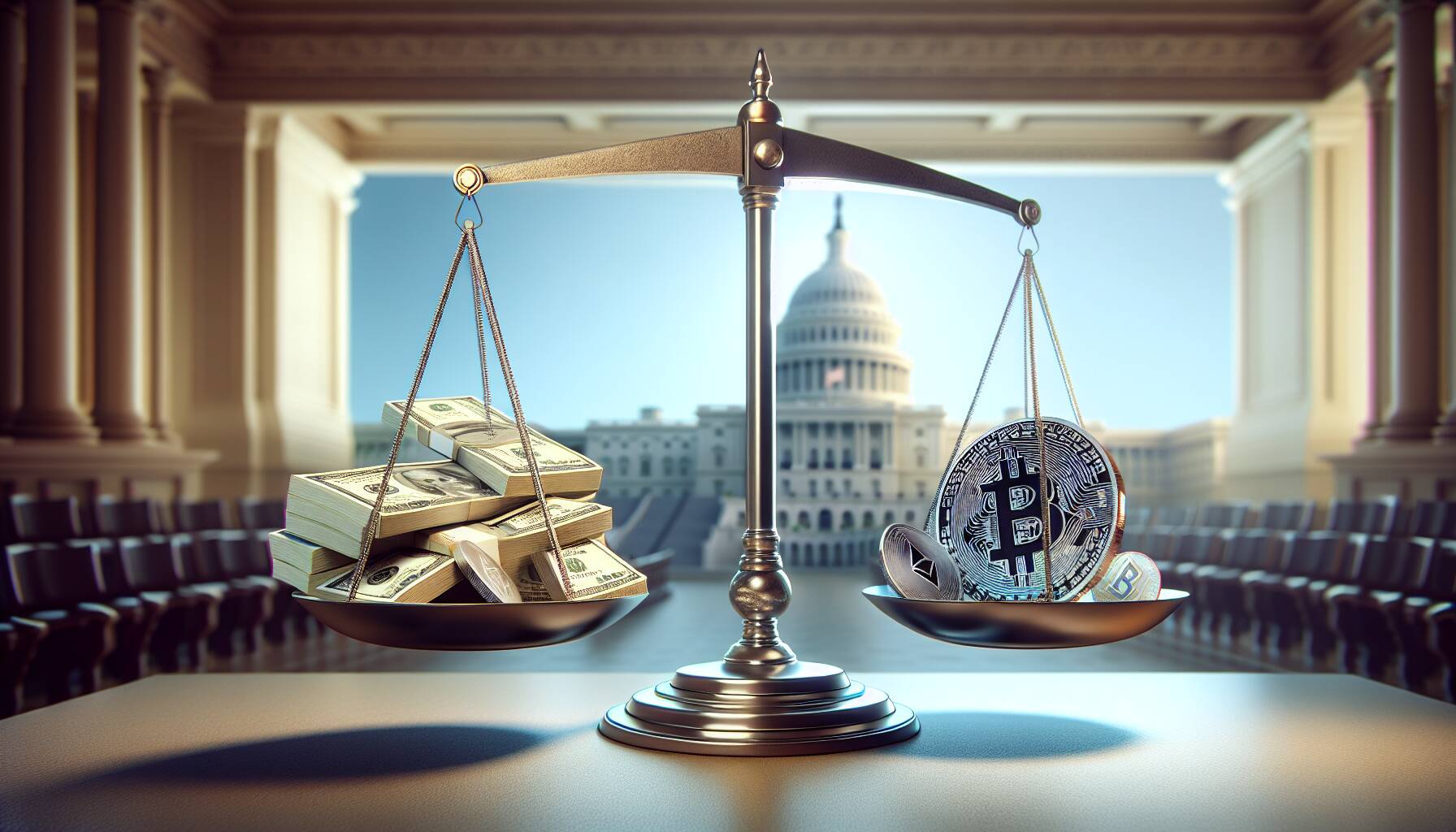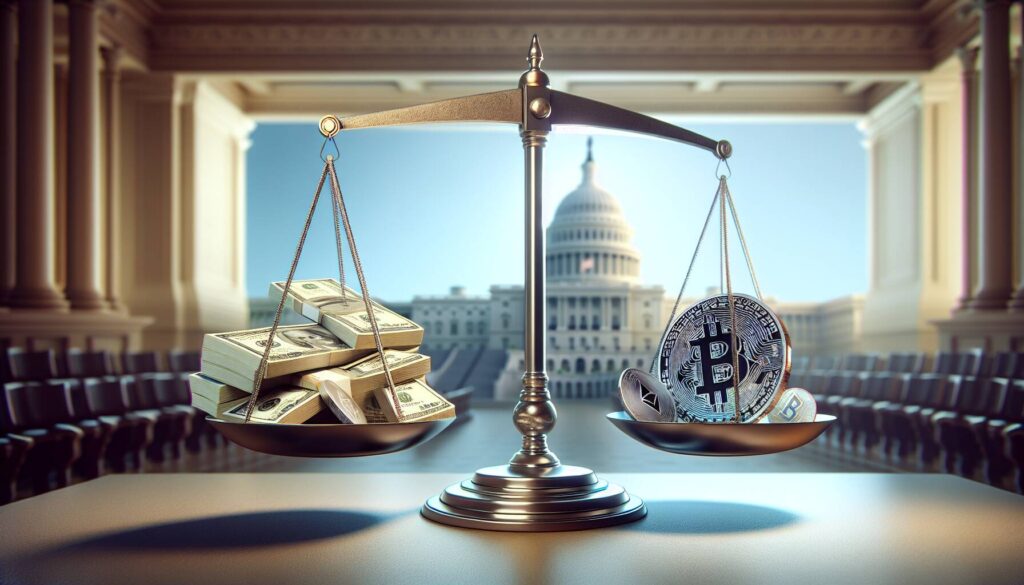The cryptocurrency landscape in the United States is poised for a significant shift as lawmakers unveil a discussion draft of a comprehensive regulatory framework. This legislative initiative, spearheaded by the House Financial Services Committee and the House Agriculture Committee, aims to create a structured regime for digital assets, marking a pivotal moment in the evolution of crypto regulation. Representative French Hill, chairman of the financial-services panel, emphasized the need for “much-needed regulatory clarity,” indicating that this draft could be the key to safeguarding consumers while promoting innovation.
On Monday, the draft details requirements for public disclosures by crypto projects and establishes mechanisms for digital asset developers to either raise capital under the Securities and Exchange Commission’s oversight or register with the Commodity Futures Trading Commission. This dual oversight framework seeks to clarify the often-blurred lines between the jurisdictions of these two regulatory bodies, an issue that has stirred confusion and concern among crypto businesses in the U.S.
As anticipation builds, a joint hearing by the digital assets subcommittees of both committees is scheduled for Tuesday, where this draft will take center stage. In a parallel effort, advocates for stablecoins are intensifying their lobbying efforts, urging the Senate to move forward with the Guiding and Establishing National Innovation for U.S. Stablecoins (GENIUS) Act. This separate but related initiative demonstrates a comprehensive approach by legislators to address the regulatory needs of various facets of the crypto market.
“Today marks the first step in advancing a comprehensive framework that protects consumers, fosters innovation, and closes regulatory gaps in oversight,”
echoed Representative Glenn “GT” Thompson, emphasizing the bill’s objective to grant both developers and users the certainty they have long sought. Coinciding efforts to address stablecoins have already gained momentum, sparking discussions in both the House and Senate, with calls for bipartisan support echoing throughout the cryptocurrency community.

Regulatory Developments in U.S. Cryptocurrency Legislation
The recent unveiling of a discussion draft in the U.S. Congress marks a pivotal change in how digital assets will be regulated. Here are the key points that could impact various stakeholders:
- Comprehensive Regulatory Framework:
- Establishment of a comprehensive domestic regime for digital asset regulation.
- Aims to deliver “much-needed regulatory clarity” for all participants in the crypto market.
- Consumer Protection and Innovation:
- Provisions designed to protect consumers while fostering innovation in the crypto space.
- Creating a secure environment for developers and users of digital assets.
- Joint Hearing on Digital Assets:
- A joint hearing by the digital assets subcommittees to discuss the future of digital assets.
- The proposed discussion draft will be scrutinized for its implications on regulation.
- Public Disclosure Requirements:
- Crypto projects will be required to disclose specific information publicly.
- This aims to enhance transparency in the crypto market, benefiting potential investors.
- Capital Raising and Market Oversight:
- Digital assets developers will have options to raise capital under the SEC or register with the CFTC.
- This introduces clear lines of jurisdiction, addressing long-standing regulatory confusion.
- Ongoing Efforts on Stablecoin Regulation:
- Separately, stablecoin legislation is also advancing through Congress, aiming for bipartisan support.
- Advocates are pushing for further legislative action to establish a stablecoin framework.
“It will give digital asset developers and users the certainty they need and have asked for.” – Representative Glenn “GT” Thompson
Regulatory Advances in the Crypto Space: A Game Changer or a Challenge?
Recently, the U.S. Congress unveiled a comprehensive legislative draft that aims to streamline the regulation of digital assets. This significant move could herald a new era of regulatory clarity for the crypto industry, which has faced ongoing challenges due to uncertainties in jurisdictional oversight. While the discussion draft of this legislation has sparked optimism among industry advocates and developers, it’s essential to weigh its competitive advantages and disadvantages in the broader context of similar regulatory efforts.
One notable advantage of this proposed framework is the promise of “much-needed regulatory clarity.” As highlighted by Representative French Hill, this clarity could foster innovation by providing digital asset developers with the confidence to navigate the regulatory landscape. Comparatively, previous efforts, such as the Financial Innovation and Technology for the 21st Century Act (FIT21), lacked the comprehensive approach now seen in this draft, making it more appealing to stakeholders who have long awaited a structured regulatory environment.
Nonetheless, the draft’s specific requirements for public disclosures and the obligations to engage with the SEC and CFTC may pose challenges for smaller crypto projects. These exigencies might burden nascent companies that lack the resources to comply with such requirements, contrasting sharply with larger, established players who might easily absorb these costs. The financial implications for emerging businesses could inadvertently stifle the very innovation the legislation aims to promote.
Moreover, the joint hearing scheduled to discuss the draft could extract valuable insights but may also expose weaknesses or concerns regarding operational feasibility. If stakeholders, such as the Blockchain Association and other lobbying groups, are unable to secure supportive modifications, the proposed regulations could turn from opportunities into obstacles.
For businesses already entrenched in the crypto space, this legislative move offers an edge in regulatory compliance, especially over international competitors unburdened by such strict frameworks. Conversely, it may complicate strategies for crypto startups and projects that thrive on decentralized, less regulated environments. The ongoing battle for support for stablecoins, like the GENIUS Act, highlights the continuing tension in the crypto landscape, where opposing forces vie for dominance in shaping the future of digital currencies.
In summary, while the new legislation could champion much-needed clarity and potentially open avenues for growth, it is equally likely to create operational hurdles for small-scale developers. Stakeholders must brace for continued debates as this draft both reflects and drives the dynamic nature of regulatory approaches in the digital asset arena.















